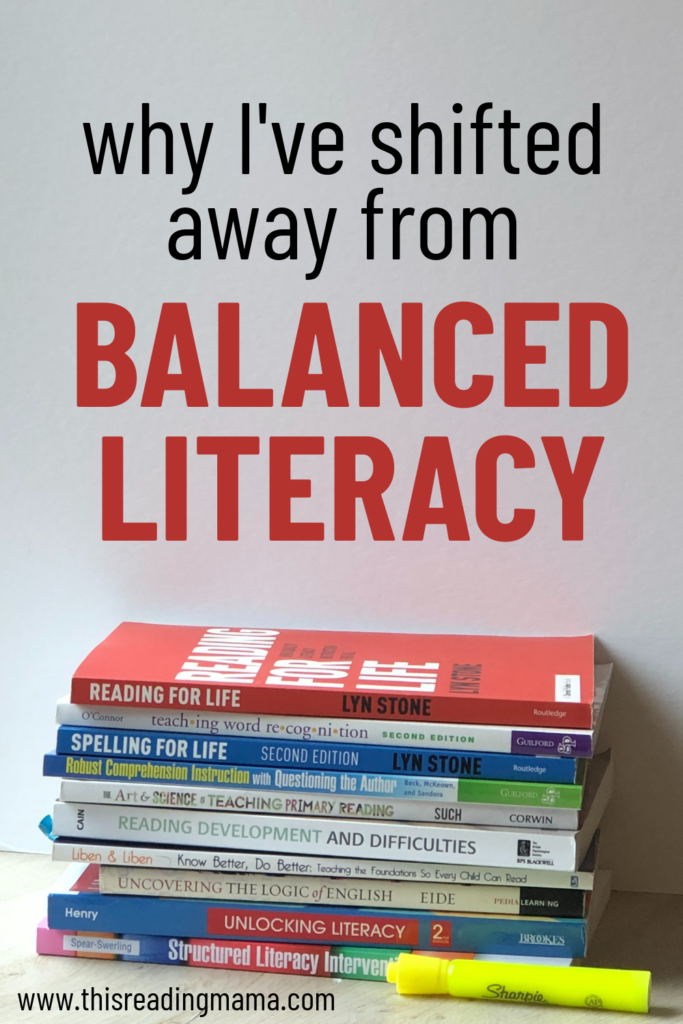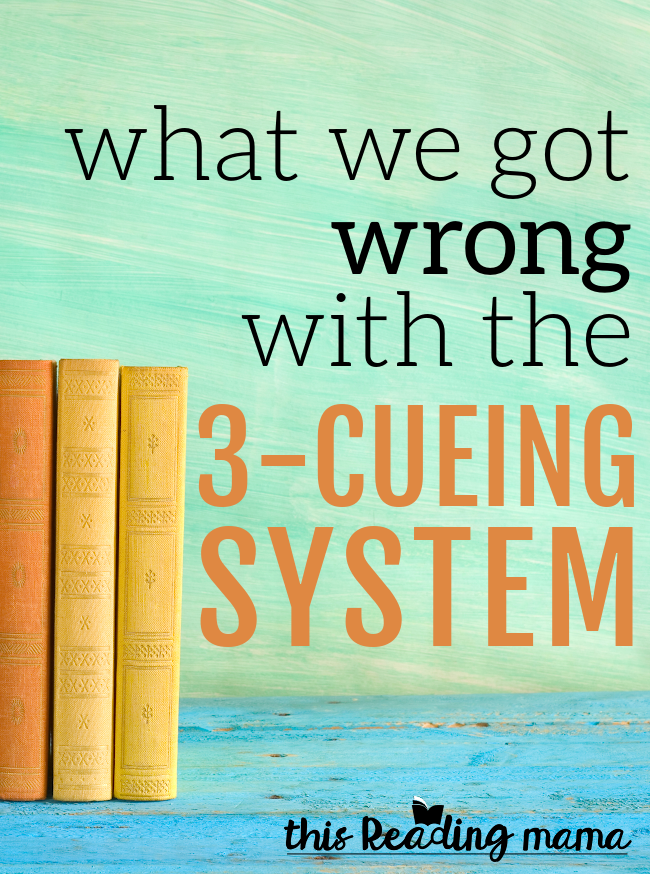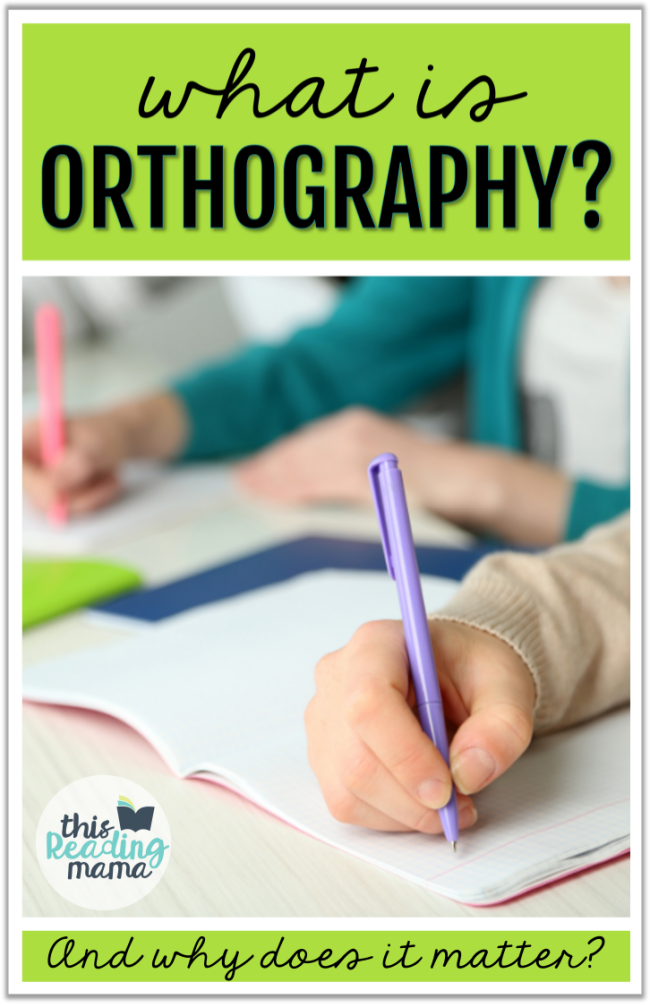The reasons I’ve shifted away from balanced literacy is a post that’s been a long time coming.
There’s a good reason for that. It’s been a slow {and somewhat painful} journey.
You may enjoy our series on Structured Literacy Series or our Resources for Dyslexia Series.

I was heavily trained in the ways of balanced literacy. Sure, I’ve always held phonics as extremely important to reading. But there are bits and pieces of my training that I’ve also gripped tightly to that weren’t so helpful to teaching kids to read.
Today, I want to explore five reasons I’ve shifted away from balanced literacy.
Want to know more? Be sure to scroll down to the bottom of this post to see our upcoming series!
*I am a participant in the Amazon Services LLC Associates Program, an affiliate advertising program designed to provide a means for me to earn fees by linking to Amazon.com and affiliated sites.
5 Reasons I’ve Shifted Away from Balanced Literacy
1. The research
One of the things I’ve always said about education is that the pendulum swings. New research comes out. Ok, now we have a new way of teaching.
Oh, look! New research. Ignore everything you’ve done for the last few years. Now, there’s something shiny and new. Rinse and repeat.
But {and this is a big but}, one of the things I’ve learned about the science of reading is that the research has been there. Honestly, it’s mostly been mostly ignored to favor balanced literacy instead.
When we use the phrase science of reading, we’re referencing a body of scientifically-based research that has been conducted over the last fifty years. Yes, you read that right. Fifty.
And using phonics readers to teach reading goes back to the 1800’s with the McGuffy readers.
2. The misunderstanding and misuse of three-cueing and context
Does context have a purpose in reading? Absolutely! Even good readers use context clues… but not how or when you might think!
The problem with using the three-cueing system or context clues is expressed by Blevins and many others who echo his sentiment.
Poor readers have a strategy imbalance. They tend to over-rely on one reading strategy, such as the use of context clues, to the exclusion of other strategies that might be more appropriate.” (Teaching Phonics & Word Study by Wiley Blevins, p. 14)
3. Practice that makes sense
Let’s say you have learners who are struggling with the concept of addition in math. So, you would teach a lesson on addition using colored counters or something hands-on, right?
If it’s time for them to practice the concept of addition, what kind of problems would you give them to work on independently? Subtraction problems? Division problems? Perhaps multiplication? No, you would give them addition problems.
The same can be said for reading. If you’re teaching lessons on short vowels and then turn around and give your learners texts to read that contain lots words like wash, car, or father, your learners aren’t practicing the skills you’ve just taught them. They need to practice text with short vowel words.
4. Building lifelong readers
One of the things I ask myself when I sit down to edit a child’s writing is, “Am I helping the child become a better writing or just improving this writing?” Of course, some edits may only apply to that particular writing, but my goal is to help them become a better writer overall. I want to give them instruction that they can then apply to their next piece of writing…and the next.
When we are asking our kids to look at the picture or think of what word would make sense in the story or sentence, we are giving our kids ideas for guessing the word that will only help them “read” that one book. {And I use the word “read” loosely because they’re not even looking at the word many times.}

When they see wash in another book, have I taught them the tools to help them read or recognize it again? Or even if I flash the word on a notecard, will they be able to decode it? Chances are, if I’m not teaching them how to look at and break apart the letters/syllables word {orthographic mapping}, the answer is a resounding no.
I don’t want to build readers that can just “read” that one book well because they have memorized it or can use the pictures to figure out unknown words. I want to build lifelong readers who have the strategies and confidence to attack the actual words in the next book they read…and the next.
5. Building strong spellers
One thing I know for sure. Phonics is connected to spelling. Spelling usually lags behind reading, but you’ll be hard-pressed to find a proficient speller who is terrible at decoding {or reading} words.
One of the reasons many of our kids struggle to spell is that they don’t know how to read unknown words. Sure, they might make guesses at words and figure them out based on the context.
But when we ask learners to guess at words based on the pictures or what would make sense, we are asking them to look away from the word. Even if we ask them to look at the first letter and get their lips ready, we are only asking them to look at one part of the word.
And learners need to look at the word…all the letters of the word…to understand how all the sounds and all letters work together to spell the word. This is called orthographic mapping.
When we skip orthographic mapping by asking our learners to look away from the word, we are skipping the very process that allows our learners to store that word for a future reading AND a future spelling of the word.
From Balanced Literacy to Structured Literacy Series…
Be sure to check out all the posts in our series by clicking on the images below.
Enjoy teaching!
~Becky








🎉👏🏻👏🏻👏🏻 Yes, girl. Thank you for all the wonderful resources I have been able to use with decodable words from your site. Bring on the phonics, all the phonics. Now that I will go cry because my last baby can already read.
I hear you! My youngest is in 5th grade this year. Excuse me while I go cry, too.
Thank you SO much for this article. The struggle is real- and some Lit. folks are really entrenched and defensive.
Your articulate examination of this issue will help us all continue to improve our teaching.
Yes, the struggle is real. I agree with you!
This is terrific –a more synergistic learning approach !!!
Yay!
So glad you have embraced the over 50 years of reading research.I have been waiting for over 30 years for educators to come around since we know reading scores have not gotten any better and we have and have always had a significant percentage of the population who are illiterate because they needed to learn how to read in a much more explicit manner. Shame on balanced literacy proponents ! And the science was there all along. I will never understand why educators clung to a method that was clearly not benefiting many starting readers. Ask their parents , if they could afford it, how much they spent on tutors to teach their children how to read! I was one of those tutors and I wished every day that the schools would wake up and put me out of a job. The truth is that most students will learn to read regardless of the teaching method, but there are those who need orthographic mapping and structured, multi sensory instruction. Please teach reading with methods so that everyone learns to read!
There’s so much I held on to because I was taught by those I trusted that it was correct. I think we must approach differences with humbleness as we keep sowing seeds of truth. We can’t force others to see it our way or to jump to where we are on the path. It’s such a process. Please know that not preaching AT you; and it’s something I have not perfected, but that I’m learning day by day.
I have learned a great deal since I started following you in May. I feel that the strategies I have been using have made a positive impact on the students I work with. I have seen amazing increases in their interest and fluency. Thank you for sharing all of you research on how to teach and have students love to read. 😉📚
You are very welcome. I enjoy sharing and learning along the way. 🙂
As a former teacher now stay at home mom, I always turn to your resources because I know they are supported in best practice. I look forward to your new series!
Awesome! 🙂
Thank you Becky for all of your posts and resources. You truly have a gift for understanding reading and your passion is very sincere.
Aw, you are so welcome. I am humbled to have the ability to learn and share.
Thank you so much for sharing! I agree 100%!
🙂
Thanks for posting this. Thanks for your honesty in sharing- backing up your findings with evidence. Yes! Welcome to the club! I recently took the Wilson Reading System that gave the research for every step of reading, spelling, writing, phonemic awareness, reading comprehension etc. It was the best – hardest thing I’ve ever done in my educational world. I look forward to more of your posts and reading/spelling activities that reflect the explicit instruction in phonics and spelling! Appreciate your work!
This is wonderful! I am the Reading Specialist at an international school, and we have a “variety” of ways our teachers approach reading instruction. I hear “sound it out” so often! I’m looking forward to your articles and hope to gently pass them along to colleagues who may be interested. Thank you so much!
Hi Becky,
I am a retired Special Needs Teacher with 40 years on the job. Now use your wonderful materials with my grandchildren. I’ve lost count of the number of times I’ve said, ‘Please don’t throw the baby out with the bath water!’ (In relation to reading, not the grandchildren!
Cheers to you for all that you share with others.
Thanks for this very thoughtful and well, balanced, post. My wife and I have been on a similar journey with our children, one of whom is dyslexic.